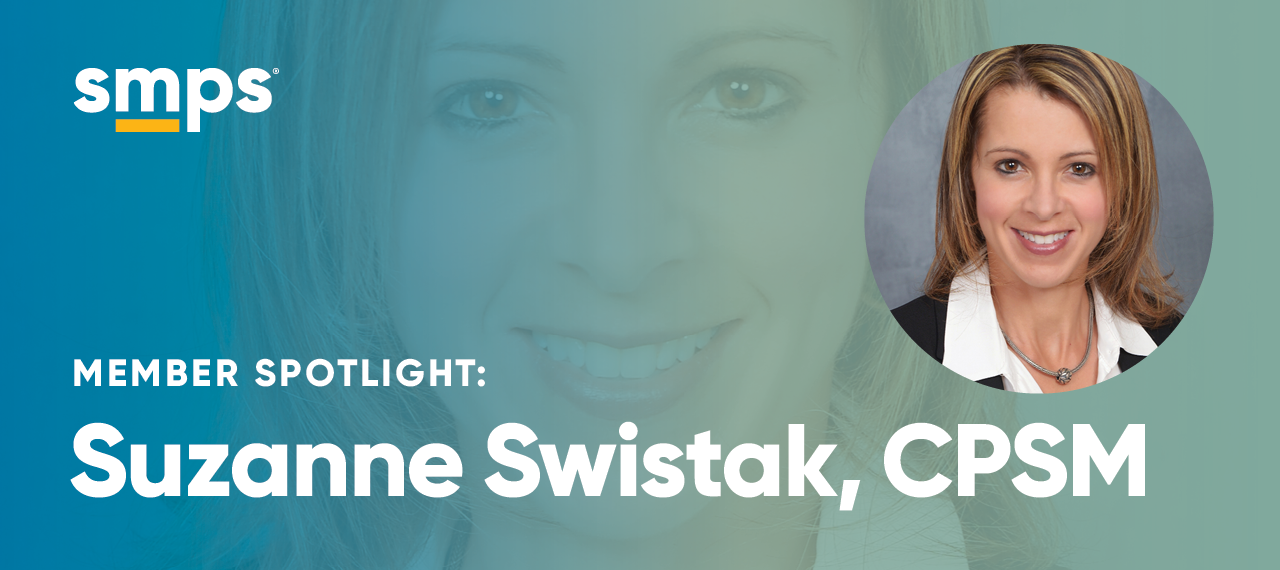
In our member spotlight, Suzanne Swistak, CPSM, takes time out of her busy day to chat with SMPS. Suzanne, who’s communications executive at ECS, shares the rewards of her job and the benefits of being an SMPS member.
Please briefly describe your role at your firm. As the ECS communications executive, I oversee all of our firm communications, both internal and external. This covers a broad range of campaigns regarding our services, employees, company news, and other topics, as well as items like corporate philanthropy, strategic partnerships, growth strategies, and branding.
What is a typical day like for you? Each morning begins with an outlook of the day’s meetings and priorities. Because the communications team is constantly working on numerous deliverables large and small, it’s important to do a short list of goals and “musts” for the day followed by the needs and wants that fit in to the overall program. Each day is filled with planning and collaboration with my team and other leaders within the company. These regular “meetings of the minds” are essential and elevate our ideas, positioning, and overall success at what we do.
What has been your most meaningful project to date? The most meaningful project to me occurs when I’m able to impart a paradigm shift by instituting a new method, idea, or output that levels up the old way of doing something and creates the 2.0 (and beyond) version of the mission. An example is when I brought a brand new shopping center to market and was looking to get word out about it and drive traffic to the center. Instead of relying on traditional expensive advertising commonly used at that time, I designed a program for moms with kids and marketed it by reaching out to local moms groups. The organic, word-of-mouth marketing that this generated snowballed and at our first program event we had 500+ people in attendance. This was before the days of social media, so I consider it a great success!
How did you decide to have a career in the A/E/C industries? Fresh out of college with a marketing degree, I got a job as a junior analyst for a government contractor supporting the aircraft carrier design team for the U.S. Navy. While the work was interesting, my job function did not leave me fulfilled, and I was itching to change careers into something that more closely paralleled my studies.
In the Washington Post, I stumbled upon a marketing position in commercial real estate property management for a local shopping mall. I got the job and, at the age of 23, I was thrilled to have an office at a place I was passionate about with a job function I was also passionate about (and an opportunity to easily spend way too much money on my lunch breaks shopping the latest trends). While it was tough to leave the mall position, I moved on to work for a real estate developer with a property management arm, and through the years had the opportunity to explore working for a small handful of different firms in the A/E/C industries in various marketing and business development roles.
Why is membership in SMPS important to you? Membership in SMPS is important to me for two simple reasons: the people I meet and the knowledge I acquire. Both have helped propel me in my career in more ways than I can count.
What’s the best career advice you’ve received? Always dress for the job you want, not for the job you have. I’ve not always followed that, but I did early on in my career and, without a doubt, it helped to elevate me in my job.
What’s the best career advice you’ve given? When crafting a response to an elevated or heated situation, always let some time pass whether it be a few hours or overnight before hitting the send button or placing that phone call. Giving yourself the opportunity to let things die down almost always results in a much calmer, rational, and dignified response—and one that you will be comfortable owning up to as the dust settles.
What has contributed to your success? Diligence. My favorite graphic that I have posted on my bulletin board defines success with two lines—one is a straight line pointing up (what people think success looks like) and one is a very squiggly line (what success actually looks like). The second line also ends at that same upward point, but reflects the windy road that most often we find ourselves on to get to our destination. That windy road doesn’t always point in the direction of where we’re trying to go, but we must remain diligent in the journey we’re on to get there.
What’s on your bucket list? To get my golf score under 100!
What was your childhood dream? I wanted to become a criminal defense attorney. I watched Matlock, Perry Mason, Murder She Wrote, and other crime shows religiously growing up.







